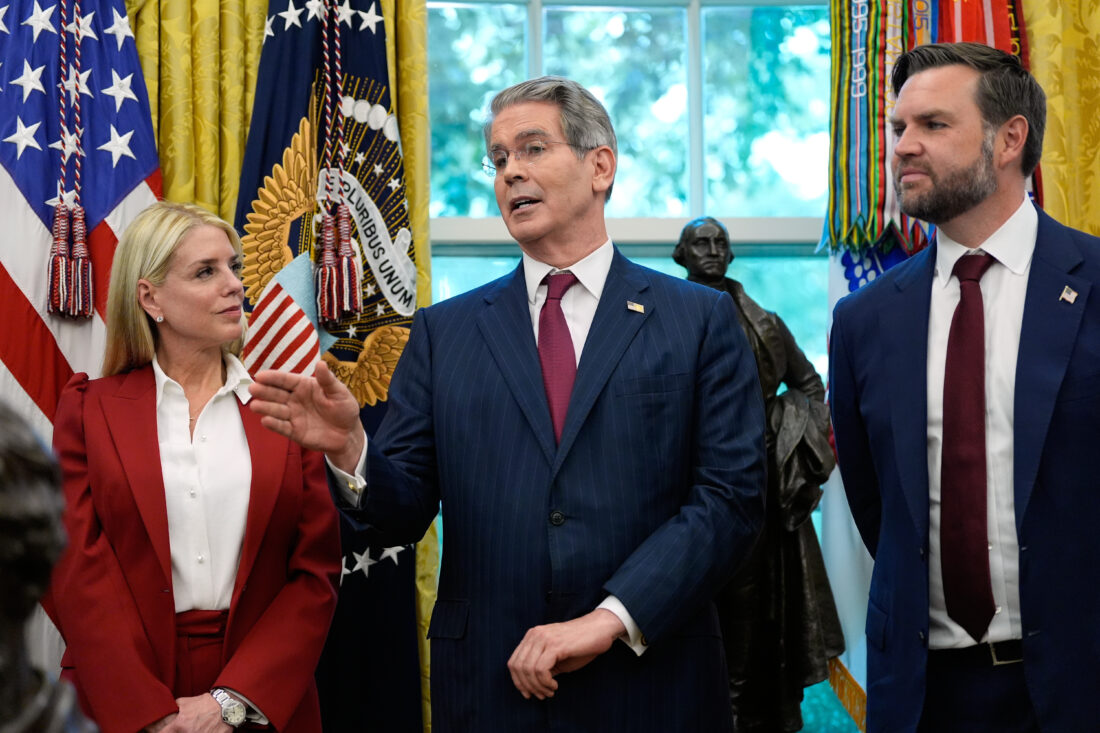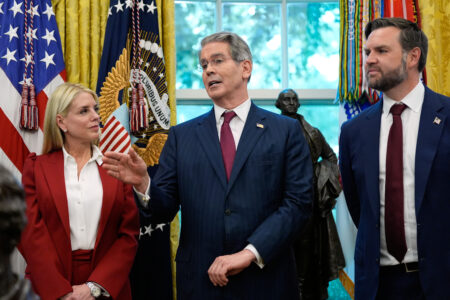Trump says China’s Xi has approved TikTok deal

Treasury Secretary Scott Bessent speaks after President Donald Trump signed an executive order regarding TikTok in the Oval Office at the White House on Thursday in Washington, as Attorney General Pam Bondi and Vice President JD Vance listen. (AP Photo/Alex Brandon)
WASHINGTON (AP) — President Donald Trump has signed an executive order that he says will allow TikTok to continue operating in the United States in a way that meets national security concerns laid out by the law.
President Joe Biden signed legislation last year calling for China’s ByteDance to sell TikTok’s assets to an American company by early this year or face a nationwide ban, but Trump has repeatedly signed orders that have allowed TikTok to keep operating in the U.S. as his administration tries to reach an agreement for the sale of the social media company.
Much is still unknown about the actual deal in the works, but Trump said Thursday that Chinese leader Xi Jinping has approved it. Any major change to the popular video platform could have a huge impact on how Americans — particularly young adults and teenagers — consume information online.
The Chinese embassy in Washington didn’t immediately respond to an AP inquiry seeking confirmation that China has signed off on the proposed framework deal.
About 43% of U.S. adults under the age of 30 say they regularly get news from TikTok, higher than any other social media app including YouTube, Facebook and Instagram, according to a Pew Research Center report published Thursday.
Trump said in response to a question at a signing ceremony Thursday that he would make the American- controlled TikTok “100% MAGA” if he felt he could, but he intends for “every philosophy, every policy” to be “treated right.”
Vice President JD Vance said the deal ensures that “American investors will actually control the algorithm” that determines the content seen on the social media app. He said more information about the deal will be revealed in the coming weeks.
Under the terms of the deal that have so far been revealed by the White House, the app will be spun off into a new U.S. joint venture owned by a consortium of American investors — including Oracle and investment firm Silver Lake Partners.
Though the details have yet to be finalized, the investment group’s total stake in the new venture would be around 80%, while ByteDance is expected to have a 20%, or smaller, stake in the entity. The board running the new platform would be controlled by U.S. investors. ByteDance will be represented by one person on the board, but that individual will be excluded from any security matters or related committees.
TikTok’s new owners include many whose business or political interests are tied to Trump, including Oracle co-founder Larry Ellison and Rupert Murdoch, raising questions about whether political influence will be exerted into the platform.
Although he stepped down as Oracle’s CEO more than a decade ago, Ellison remains heavily involved as chairman and chief technology officer. Now 81, he could be in line to become a behind-the-scenes media power player, having already helped finance Skydance’s recently completed $8 billion merger with Paramount, a deal engineered by his son, David.
Trump also mentioned Dell founder Michael Dell will be an investor in the new venture.
TikTok users could now “get the editorial policies of the people who now have control of the company,” said David Greene, civil liberties director of the Electronic Frontier Foundation. “It won’t be 100% MAGA. The question is how it will treat criticism of him and people he likes.”
The recommendation algorithm that has steered millions of users into an endless stream of video shorts has been central in the security debate over TikTok. China previously maintained the algorithm must remain under Chinese control by law. But a U.S. regulation that Congress passed with bipartisan support said any divestment of TikTok must mean the platform cut ties with ByteDance.
American officials previously warned the algorithm — which is a complex system of rules and calculations that platforms use to deliver content to your feed — is vulnerable to manipulation by Chinese authorities, who can use it to shape messaging on the platform in a way that’s difficult to detect, but no evidence has ever been presented by U.S. officials showing that China has attempted to do so.


